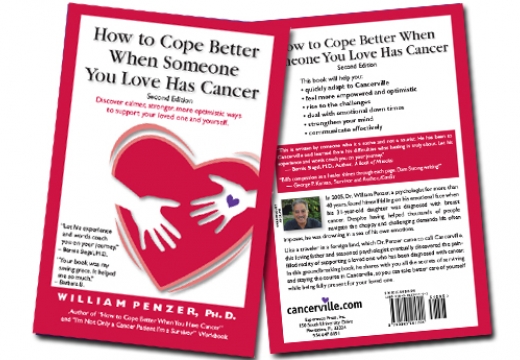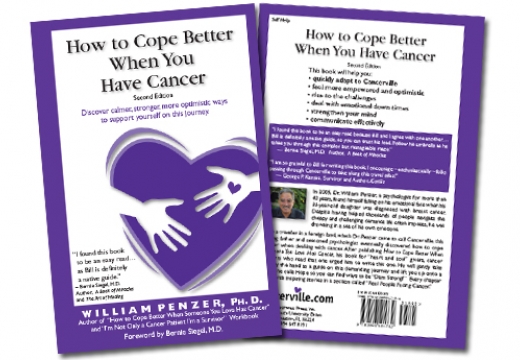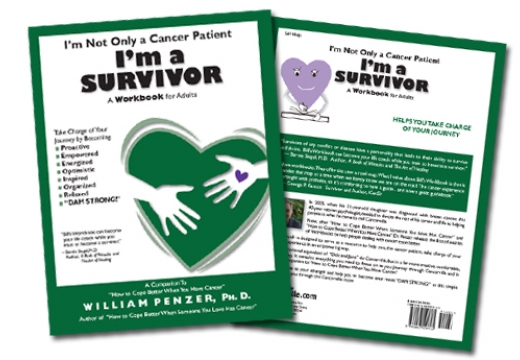At a recent cancer conference I met a young man whose wife had cancer. He was almost 20 years military—Special Ops/Navy SEALs—hardcore stuff with five tours in the Middle East. I said to him, “I often view cancer as a war zone. I guess the military helped prepare you to deal with cancer.” He welled up and responded thoughtfully, “With all due respect sir, NOTHING prepares you for dealing with cancer!”
That response took me right back to 2005 when our 31-year-old daughter was diagnosed with breast cancer. In the flash of a phone call we became caregivers—a role no one ever wants! As a psychologist, I am a strong lifeguard on the emotional beach guiding people through life’s choppy waters. There and then I was absolutely drowning in those very waters.
Key One: Adaptation
I felt we had entered a strange land with its own culture, customs, language, and protocol. I felt as lost as a traveler in a foreign country, and there was no GPS to guide our way. That is why I called it Cancerville. It was a place like no other I knew.
My wife and I fumbled and stumbled early on, but she actually adapted better and quicker than I did. Eventually, I was able to reign in my rage, overcome my overwhelmtion, get a grip on my fears, accept and adapt to this difficult and demanding situation, while being a contributing member of our team.
The more involved my wife became and the more helpful actions she took, the better able she was to adapt and deal with our daughter’s situation. I soon realized that action begets adaptation too.
I never loved the word caregiver as I find it a bit cold, if not sterile, for family and friends. It works for me for the medical team, but I feel those of us with loved ones in Cancerville are more “heart and soul givers.” That is why the adaptation process takes a while. You just don’t want to see your loved one suffer—no one does.
That said, no one volunteers for this particular assignment. Cancer happens and we need to find ways to adapt. That is step one, and that is the first key to being a “heart and soul giver.” In fact, we have all adapted to many challenges in our lives starting the day we were born, so there is a rich history in each of us from which to draw. Think about the tools you have used in other situations so you can apply them to your Cancerville journey. We each adapt in our own unique way, but eventually we all figure it out and move forward.
Key Two: Ventilation
The second important key that I personally found helpful was ventilation. I needed ways to vent my angst at the unfairness of it all. You just never want to see your loved one hurting—bald and all—NEVER! I journaled like a madman because I was a very mad man! I must have filled ten or more yellow pads with my scribbling rants. It was my scream in the night and my right. Oddly enough, I hid them and now can’t find them, but they served an important purpose at that time.
I also returned to counseling to serve the same purpose. I had long ago found out that my doctorate degree didn’t come with a vaccine! Support groups serve a venting purpose as well, but it is not always easy to find a relevant one, though definitely worth a try.
Key Three: Communication
The third key and the most slippery slope is communicating with your loved one. There are chapters in my books dealing with this complicated territory; I don’t even think a whole book devoted to that topic would be sufficient. Much will depend on the age and nature of your loved one. However, your role is to try to always be a supportive assistant, understanding the emotional maelstrom that comes with Cancerville.
There will be times you will need to take a deep breath or two, table the issue, and revisit it another way later. There may be times you will need and want to offer an important opinion. Many a “heart and soul giver” has had to take a strong stand when their loved one was out of gas and refusing demanding, but important, treatment options.
Key Four: Inspiration
A most important key to being a “heart and soul giver” is to draw inspiration from the many positive survivorship stories in Cancerville. I have written about two complementary philosophies—realistic optimism and unrealistic optimism. The first encourages you to be optimistic if it is realistic based upon stage, severity, treatment options, etc.
The second is based on faith in miracles and the many stories of people who have survived against all odds. Watch out for sadistic statistics, as they are based on populations of people, while your loved one is a unique individual. Try to ride through Cancerville on a horse I call HOPE. Even if it doesn’t change the outcome, it makes the journey a little easier.
 In Sum
In Sum
On that note, let me conclude by telling you that our daughter’s story is a very inspiring one—she is a nine-year survivor! Two years after her treatment we bought a trip to Africa at a breast cancer fundraiser. My wife and I, along with our daughter and her fiancé (who hadn’t run away), had the experience of a lifetime, which included their getting married in a Maasai Village in Tanzania. The video of that amazing experience can be viewed atcancerville.com. It is called “A Modern Day Fairy Tale.”
 Perhaps the very best part of the whole story is that, against all odds and predictions, they had a beautiful baby girl eighteen months ago. Miracles can and do happen!
Perhaps the very best part of the whole story is that, against all odds and predictions, they had a beautiful baby girl eighteen months ago. Miracles can and do happen!
In addition, I decided to devote the rest of my career and my life to helping people in Cancerville, and toward that end have written three books, many articles, and have spoken at many cancer-related conferences. I always start my talk the same way, “I am happy to be here and unhappy to be here, and I bet you feel similarly.”
All of this is proof to me that people can go from the outhouse of Cancerville to the penthouse of life and even to its pinnacle. I sincerely hope that happens for your loved one and yourself, and toward that end I wish you Godspeed. I also hope it happens for that young military man who has done so much for our country. He deserves a break from the war zones of life as well as Cancerville.
Also published on Cancer Knowledge Network







